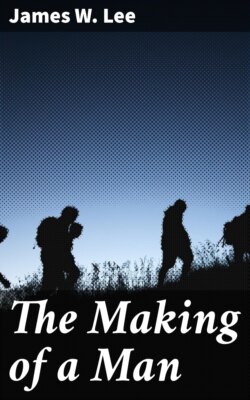Читать книгу The Making of a Man - James W. Lee - Страница 8
На сайте Литреса книга снята с продажи.
IV.
ОглавлениеTable of Contents
Man has no deeper and surer impression than that the world belongs to him and was made for him. It is deepened year by year, too, as he sees the relations he sustains to it increase. No more certainly are the walls, roof, and floor of a house related to the comfort and protection of the family, than are the elements, forces, and seasons of nature related to the well-being and civilization of man. Mountain and sky, meadow and forest, the past and the present are permeated with the thought, or idea, of man, whether in the first stages of progress, keeping beasts at bay with sling or stone, or at a more advanced period, tunneling the rivers and digging down the mountains. Young or old, child or man, nature stands ready to serve him. Water from her skies flows through his veins to and from his beating heart. Trees and shrubs and herbs minister to his pleasure and his ills. Rocks, and timber, and steel lend themselves to his service for house, hatchet, or chisel. When he ascends sufficiently in the grade of civilization to give expression to his conceptions of beauty, he finds the colors in the ores under his feet to embody his visions. Would he illuminate his humble home at night, there is the pine with its light-giving tar. Does he live amid the plains, where the pine does not grow, there is the ox with his tallow ready to be made into candles. Does he live on the coast, away from the ox or the pine, there is the whale with his oil. Does he want a better light than pine, or tallow, or oil can give, there are the coal beds, with their sunshine laid up for his use for thousands of ages. Does he wish to turn night into day, and make his streets glow with the radiance of the stars, there is electricity to be drawn from its wide, mysterious fields, to serve his growing desire. Would he cross the sea, the winds lie ready to fill his canvas and draw him from continent to continent. Are the winds too slow, there is the heat, stored in the mountains, ready to move his engine and drive his wheel. Does he wish to make himself ubiquitous, and send a message across the sea, before a ship could get out of port, there waits on him again the mysterious lightning.
Nature teems with elements and forces to wait on man’s every thought, to gratify his every desire, and to respond to his every aspiration. With all her wealth she surrounds him, and in ten thousand ways invites him to use it. The naturalist Guyot said the hand of man prefigures his destiny as an intelligent worker. So the form of all continents and islands, the outlines of all seas and coasts, contain the idea of the human family. At a time, geologically about the same, the surface conditions of the earth were prepared for the advent of man. The great Himalaya Mountain range was lifted up to prepare an embosoming plain to serve as a cradle for the human race. The long chain of mountains running through the whole length of the North and South American continents was raised to prepare the way for civilization on this side of the sea. When the ocean beds were dug out and the waters called off from a part of the earth’s surface; when the mighty peaks and the majestic turrets of the mountain chains were lifted into the sky; when the encompassing atmosphere was filled with all life-replenishing elements and wrapped about all oceans and shores; when the poisonous forces destructive of man’s life were locked up in soils and rocks; when the meadows were sown with grasses, and the hospitable arms of the trees were loaded with fruit, then, upon the earth, adorned and ready for his coming, man appeared.
